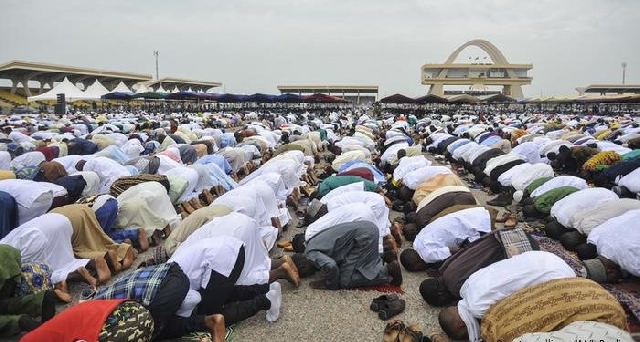Ghanaians, especially the Muslim community joined their compatriots across the globe to commemorate Eid-ul-Fitr, the day set aside to observe the successful end to 30 days of fasting.
The enthusiastic manner by which all Muslims showed up at the prayer centres is indicative of their resolve not to allow any obstacle to stand in their way in the worship of Allah.
We all know the challenges of our time, however the Muslims spotted their best clothes to mark the end to the Ramadan in one big ceremony at all the prayer venues. We must congratulate our Muslim brothers and sisters for successfully renewing their faith through the spiritual purification exercise during the month of Ramadan.
But amidst this successful exercise is the confusion that greeted the date for the observance of the Eid-ul-Fitr.
Some Muslims in our country marked the Eid last Wednesday because of the way this religious festival is managed in recent times. It appears to us that the day is fixed by the government without due regard for the nuances of the Ramadan.
The Eid is not marked just on account of 30 days of fast but based on the sighting of the lunar moon. Unlike Christmas and other public holidays that are fixed, the Eid festivities are observed by most Muslims only upon the sighting of the moon. Thus the government should not just be interested in fixing the public holidays, but the Ministry of the Interior must do extensive engagements in order to arrive at a decision that is not in conflict of the religious protocols.
This spiritual injunction on Muslim faithful, the Ramadan as one of the five pillars of Islam has been marked without controversy in the past. Across the length and breadth of the country, Eid-ul-Fitr was observed in one accord without any group disputing the date earmarked for the popular Eid even among non-Christians.
We started experiencing this dissonance recently when the dates from the Kingdom of Saudi Arabia, Nigeria and Morocco started to conflict with ours in Ghana. This year in particular, the conflicting dates took the shine away from the event as some Muslims marked the Eid last Wednesday with prayers and the gesture of sharing food and other gifts with their less privileged Muslims and non-Muslims in the country. This conflict left many confused about this year’s Eid as many wondered whether Muslims would say prayers to mark the end of the Holy month of Ramadan.
To avoid confusion about future Eids and take away the shine from the celebrations, the government and the leadership of Muslim groups must engage to avoid conflicting dates for the event.
We believe it is to cure this confusion that in some countries like Nigeria the government gives two public holidays to mark the Eid. That way even if there is confusion over the exact date, the Muslims find space within the two days to commemorate the Eid in prayer and ceremony.
Going forward, we suggest to the government to adopt a similar arrangement so that secular authority does not come into conflict with the spiritual leadership.
Be that as it may, the conflicting dates did not take away the significance of the Ramadan fast and the observance of the Eid-ul-Fitr. It is for this reason that we urge our Muslim brothers and sisters as well as all Ghanaians to live up to the tenets of Islam as they showcased during Ramadan when they denied themselves food and prayed for personal renewal and for the entire nation.
The Chief Imam, Sheikh Osman Nuhu Sharubutu and the President of the Republic, Nana Akufo-Addo, both admonished Muslims to adhere to the teachings of Islam so that their 30-day fast would not just be mere fanfare.
We salute all Muslims for the sacrifices they endured during the 30-day fast and wish that the Almighty Allah would bestow on them the blessings of the Ramadan fast and prepare those who are capable for the upcoming pilgrimage to Mecca. Eid Mubarak!


